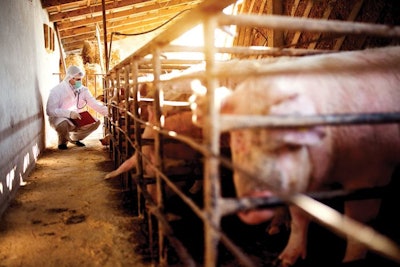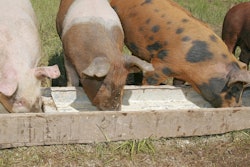
In the Philippines, there continue to be successes in the control of African swine fever (ASF) in some provinces, while others succumb.
Of the nation’s 82 provinces, 60 are struggling to control the disease, reported Philippines Star this month. Just 11 provinces have recorded no ASF cases so far.
First cases in the Southeast Asian country were confirmed in July 2019, according to official notifications to the World Organisation for Animal Health (WOAH).
Active cases of the disease are present in 15 provinces in 10 regions of the country. This is according to the latest update from the Bureau of Animal Industry (BAI) — part of the Department of Agriculture — on February 6. Compared with the situation at the end of 2023, these figures represent increases from 10 provinces and six regions.
In recent days, new ASF cases have been confirmed in Southern Leyte, reports the Philippine News Agency (PNA). Diseases control measures have been stepped up around the affected towns in this province in the Eastern Visayas region.
Attempts are also being made to develop a unified ASF control strategy for Mindoro, according to the same source. At the end of January, cases were confirmed in three towns in the province of Occidental Mindoro. These were blamed on unscrupulous pork traders who do not comply with official health protocols. Authorities in neighboring Oriental Mindoro are taking steps to prevent the entry of the virus to another province in the Mimaropa region, which is located southwest of the island of Luzon. The latest BAI update indicates multiple outbreaks ongoing in both provinces.
In more positive news, PNA reports that 52 of the 72 areas of the Bicol region in South Luzon are now classified as “buffer zones” for ASF. This means they have recovered from previous ASF outbreaks, although they share a border with an area where the disease is still present.
ASF in pigs reported in 3 other Asian states
At the end of last month, the veterinary authority of Nepal notified WOAH about three further ASF outbreaks on pig farms.
Starting in the period January 12-30, all of these affected premises located in one of two adjacent districts in the central province of Gandaki. Directly impacted were a total of 166 swine.
These bring to 43 the total number of ASF outbreaks in Nepal since March 2022, with more than 24,500 pigs directly affected.
So far this year, the animal health agency in Indonesia has recorded 56 cases of ASF in pigs. All of these have occurred in East Nusa Tenggara.
According to the United Nations’ Food and Agriculture Organization (FAO), around 60,000 pigs in Indonesia were affected by ASF in 2023. This total included more than 1,000 in the province of East Nusa Tenggara, while Riau Islands had the most cases at more than 35,000.
With a total of 714 recorded outbreaks in 2023, FAO reports that the ASF situation is gradually being brought under control in Vietnam. This figure compares with more 6,000 outbreaks in 2019, when the nation’s first cases were recorded.
During last month, ongoing or recent outbreaks of the disease occurred in 23 districts. These were confirmed in one province in each of the following Vietnamese regions: Northwest, Northeast, North Central Coast and Mekong Delta.
South Korea: Latest farm outbreaks confirmed
Two ASF outbreaks on South Korean pig farms reported in January have been confirmed to WOAH.
The nation’s first outbreaks in 2024 started in mid-January. Affected were one farm with 519 pigs in North Gyeongsang — the first outbreak in the population in this eastern province — and another with around 2,400 animals in the most northwestern province of Gyeonggi.
These bring to 40 the number of outbreaks involving domestic swine in South Korea since the first cases in September 2019.
Based on data from Pigs & People, the number of domestic animals directly impacted by ASF so far total more than 134,000.
As of February 9, the same source puts at 3,662 the total of the country’s wild boar that have tested positive for the virus over this period.
ASF developments elsewhere in Asia
Ahead of the Lunar New Year holidays, Japanese authorities announced a stepping up of quarantine measures at various entry points, reported Asahi.
So far, no cases of ASF have been detected in Japan. However, as the disease sweeps across much of Asia, authorities say that travelers bringing in unregulated pig meat products present a risk of spreading the ASF virus.
A Taiwanese passenger whose luggage included two sushi rolls purchased at Hong Kong airport has appealed unsuccessfully against a penalty for illegal importation of pig meat, reported Focus Taiwan. Her appeal was based on her being unaware that the rolls contained any meat. Although her appeal was dismissed, the passenger will be allowed to pay the fine of TWD200,000 (US$6,400) in installments.
The report also included a warning from Taiwan authorities to arriving New Year travelers not to bring pork products from ASF-infected areas.
View our continuing coverage of the global African swine fever situation.
China: FMD outbreak in pigs 'resolved'
Chinese authorities have declared to WOAH that an earlier foot-and-mouth disease (FMD) outbreak series has been closed.
In early December, illegal movement of animals was reported to be the cause of seven cases of the disease among a group of 156 pigs in the southwestern city Chongqing. No further cases have been detected since that time.
Based on WOAH notifications, FMD outbreak series are ongoing elsewhere in the world. However, the recent outbreak in Chongqing is the only one to involve domestic swine.
Like ASF, FMD is a notifiable disease that can cause high morbidity and mortality in affected species, which include wild and domestic cattle, sheep and goats, as well as pigs.
According to WOAH, FMD circulates in 77% of the global livestock population. Seven strains of the Aphthovirus are known to be present widely in Africa, Asia, the Middle East and a limited area of South America.

















